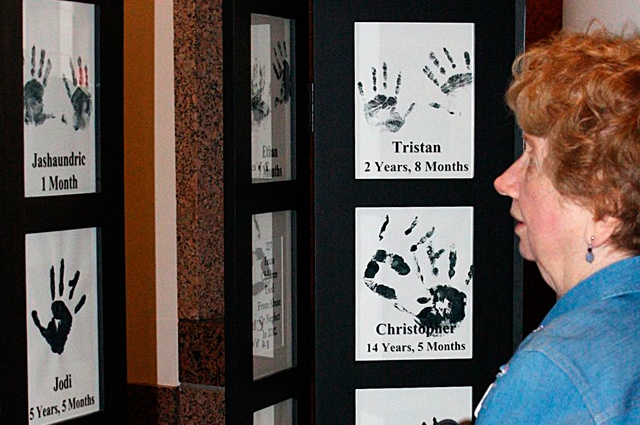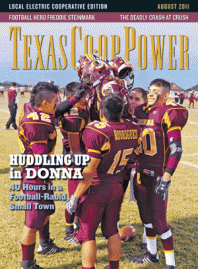At CASA Day at the Capitol February 1, 2011, in Austin, hundreds of people pored over a display that featured children’s inked handprints, names and ages. The display was not meant to be sentimental: Rather, it was a memorial for the 227 children in Texas’ foster-care system who died in 2010 because of abuse and neglect.
A special group of people across the state are working hard to make sure that heartbreaking statistic drops to zero: Court Appointed Special Advocates, or CASAs, are regular folks—not social workers or lawyers—appointed by judges to speak for those who can’t speak for themselves: abused and neglected children. In 2010, there were almost 43,000 children in foster care in Texas. Fewer than half of them had CASAs.
CASA volunteers represent the children’s best interests and work to move them through the foster-care and court systems as quickly as possible into safe, permanent homes. According to Texas CASA officials, CASA volunteers help shorten the time a child spends in foster care. And children with a CASA worker are less likely to re-enter the child welfare system once their case is closed.
That’s good for the children and taxpayers: According to Texas CASA officials, the state spends $21,766 in total one-year costs for one child alone in foster care.
Numerous electric cooperative members across rural Texas are fighting for these children. We spoke with four co-op members, and while their lives and stories are different, their messages are the same: CASA needs more volunteers.
Debbie Ferguson, Rita Blanca Electric Cooperative member
Ferguson, the Texas CASA board president, says that about 22,000 children in Texas foster homes don’t have a CASA volunteer. “The CASA is oftentimes the one consistent person that these children have,” she says. “The children learn to trust that they have a voice in the courtroom and elsewhere through their volunteer. There are so many good things that a volunteer adds to their life: seeing things through with school, health, family visits, not losing siblings and oftentimes being able to do fun things together, or just talking.”
Ferguson joined the CASA 69 board in the Panhandle town of Dalhart in 1996 and quickly realized she need to become a CASA volunteer in order to serve as a more knowledgeable board member. “Continuing my service to children throughout all of these years has left me with many treasured memories,” she says. “Serving on the Texas CASA board has been both eye-opening and challenging. It is truly rewarding knowing that people all over the state of Texas are working hard to serve these very vulnerable citizens, our children.”
Ferguson continues: “My current CASA child is 14 going on 20. She has suffered many unimaginable things through her life from birth to age 9. She has seen a lifetime of disappointment and pain. It has taught her to be very slow to trust or rely on anyone, and she struggles with everyday challenges and her own self-esteem. It makes me very happy every time I see her face light up when I visit her. I am dedicated to the goal of her knowing that she can depend on me to make sure that her best interests are always my priority as her CASA volunteer.”
CASA 69, established in 1986 by the late Bill Sheehan, a district judge, was the first CASA program established in a rural area for abused or neglected children. Texas’ first CASA program of any kind was established in 1979 in Dallas. Today, Texas has 69 CASA programs serving 204 of the state’s 254 counties.
Cheryl Reed, Nueces Electric Cooperative member
Reed, a CASA volunteer and the legislative advocacy chair for CASA of the Coastal Bend, has been helping children find their way through the court system for five years. In one case, she was the CASA for five siblings, all with different fathers save a pair of twins, one of whom she called CASA John.
While under Child Protective Services care, CASA John was moved—without warning—15 times in less than two years. “He felt unwanted,” Reed says. “An aunt chose to keep his older brother and twin sister over him. Family friends offering him a home decided against it. A foster home where he and his younger siblings were placed decided to keep them but told CPS to pick John up. A foster dad kept him two days and returned him.
“There are more ‘unwanted’ stories that can be told,” she says. “I was the only continuity in his two-year stay in state care while everything around him changed. I was his only link to anything familiar. And, he knew I was someone he could count on.”
Reed said she’d get calls from CASA John, who proudly kept her crumpled business card in his back pocket, his only link to the one constant in his life. Reed helped CASA John find his forever home two years ago, and after adoption he changed his name to Austin. On Christmas Eve 2010, Reed received a phone call from Austin, now 17, wishing her a merry Christmas. He later told Reed, “I carried the card because you felt to me like you were my mom, like you really cared for me. That’s why I always carried it in my wallet. If you didn’t help me I don’t know what would have happened. I’d probably be in jail or something.”
CASA is a win-win situation for Texas, Reed says, noting that a base of volunteers is cost-efficient in and of itself. Not to mention that the volunteers are unselfish with their time:
“Since advocates usually only take one case at a time, the child, or children if there are siblings, receive more individualized attention and so does their case,” she says. “Thus, CASA saves the state money, and at the same time, better cares for the most vulnerable of our population: the abused and neglected children.”
Bill Townley, Sam Houston Electric Cooperative member
Townley, construction manager for Sam Houston EC, has been a CASA volunteer since October 2006. He has worked on three cases, each with an infant or a toddler. The children were in the system because of abuse or neglect, and each case ended in adoption.
“I don’t take any pleasure in seeing a parent’s rights terminated, but when they cannot provide for the children and neglect them for whatever reason … it is for the best interest of the child,” Townley said. “I do feel good about being part of the process in getting a child out of a bad situation and helping them find a new family that will love and take care of them. This is a life-changing event for these children, and [I enjoy] helping them to break the cycle that seems to be perpetuated in our society mainly because of alcohol and drug abuse.”
As a man, Townley is helping fill a gap in CASA: Most of the volunteers are Caucasian females, and while volunteers are always needed, there is a particular need for male and minority volunteers, particularly Hispanics and African-Americans. Because of this lack of diversity, many children aren’t getting the opportunity to identify with someone of the same race or sex to make them more comfortable.
“Children need the opportunity to identify with someone [like them], but I would tell anyone interested in becoming a volunteer that it is more important to have a CASA volunteer of any sex or race than not to have one at all,” Townley said. “I would [also] tell anyone interested in volunteering with CASA the same thing I was told when I began: ‘Your life will never be the same.’ Yes, there are times when it is frustrating to deal with the system.
“But in the end, it is the best system in the world in that it attempts to balance the rights of the parents and the rights of their child. In my experience thus far with CASA, it is so rewarding to know that I am an advocate for a child and able to see the positive life-changing events in that child’s life.”
Katherine Kerr, Bartlett Electric Cooperative member
Kerr, Texas CASA’s communications and public relations manager, also addressed the need for more diversity: “We need more volunteers, especially men and African-American and Hispanic volunteers,” she says. “More than half the children in care are male, but the majority of CASA volunteers are women. Boys need strong, positive role models to help break the cycle of abuse. We also need bilingual volunteers, especially with the changing demographics of Texas. And, we need both African-American and Hispanic volunteers as about a third of the children in care are African-American and a third are Hispanic.”
Dallas, Fort Worth, Houston and San Antonio have the programs with the largest numbers of unrepresented children. While there are fewer residential electric co-op members in those areas, Kerr says there is a pool of commuters from which to draw.
“Those prospective volunteers might find it more time efficient to volunteer for the programs where they work so they can go to the courthouse near their workplace or visit a child in that community, rather than interrupting their workday to return to their home county,” she says.
El Paso and Austin also typically have large numbers of unserved children, and the Brownsville, Edinburg and Laredo areas “desperately need more volunteers,” Kerr says.
Can’t volunteer? You can still help.
In addition to volunteering, there is always a need for people willing to serve on the boards of directors for CASA programs, especially those who are passionate about helping children and have an understanding of business practices and nonprofit management. If someone is unable to commit to being a CASA or a board member, there are also numerous short-term opportunities such as helping out in an office or with a fundraiser or donating money.
“If people want to make a difference in abused or neglected children’s lives, there are many, many ways to help,” Kerr says. “We have such amazing folks speaking up for kids. When volunteers do it because they want to and not because they’re paid, that means a great deal to kids.”
——————–
Ashley Clary, field editor


